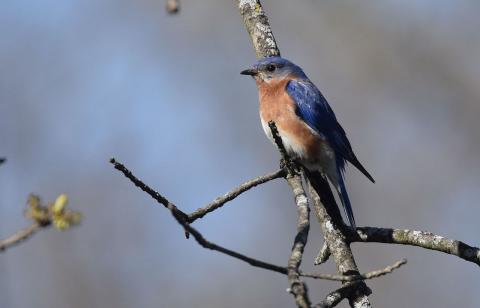Is it normal for Eastern Bluebirds to overwinter in New Hampshire?

Except for far northern New Hampshire, winter sightings of Eastern Bluebirds are common and rising. The New Hampshire Audubon Backyard Winter Bird Survey for 2019 revealed a record high number of sightings here in New Hampshire.
Eastern Bluebirds have not always remained in New Hampshire year-round. In the past, they have wintered in the Southeast United States and in Mexico. However, current information from the Cornell Laboratory of Ornithology reveals a northerly shift in their range and abundance. Eastern Bluebirds are now thought to be “partial migrants.” Some birds migrate while others remain near their breeding range all winter. This has been especially true during our recent mild winters.
You can see this trend by visiting eBird.org. Managed by the Cornell Lab of Ornithology, eBird is a worldwide collaboration of citizen scientists and regional experts who provide up-to-date information about the ranges of more than 600 bird species. The abundance maps provided by eBird confirm that Eastern Bluebirds are indeed wintering here in New Hampshire.
Does this mean that wintering Eastern Bluebirds are here to stay? Time will tell if this is a permanent change. With overall warmer winter temperatures, many species are expanding their ranges into the Northeast. Since the 1960s, the average latitude of bird wintering ranges has shifted at least 40 miles northward.
With the help of humans, the Eastern Bluebird has made an extraordinary comeback from the mid-1900s when their habitat was decimated by agriculture and other bird species. Human interventions such as providing nest boxes, favorable habitats and food in the winter have greatly influenced their resurgence. To support this comeback and entice Eastern Bluebirds to your property, consider providing nest boxes and food such as suet, peanut butter mixes, mealworms and raisins soaked in hot water.
UNH Cooperative Extension Master Gardener volunteers share information about home, yard, and garden topics with the people of New Hampshire. Got questions? Master Gardeners provide practical help finding answers to your questions through the Ask UNH Extension Infoline. Call toll free at 1-877-398-4769, Monday to Friday, 9 a.m. to 2 p.m., or e-mail us at answers@unh.edu.
Related Resource(s)
Do you love learning about stuff like this?
SUBSCRIBE TO Granite State Gardening newsletter
Got questions? The UNH Extension Yard and Garden Infoline offers practical help finding answers for your yard and garden questions.
Call toll free at 1-877-398-4769, Monday to Friday, 9 a.m. to 2 p.m., or fill out webform.

